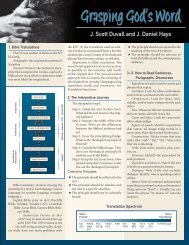A Chicken's Guide to Talking Turkey with Your Kids about Sex ...
A Chicken's Guide to Talking Turkey with Your Kids about Sex ...
A Chicken's Guide to Talking Turkey with Your Kids about Sex ...
You also want an ePaper? Increase the reach of your titles
YUMPU automatically turns print PDFs into web optimized ePapers that Google loves.
Chapter 1It’s a Tough Job,butSomeone Has <strong>to</strong> Do ItIt marked the beginning of yet another childrearing era in the Lemanhousehold when my daughter asked me, “Dad, can I have a party?”“What kind of party?” I asked.“Oh,” she said nonchalantly, “a Christmas party.”“Sounds good <strong>to</strong> me,” I said. “Who are you going <strong>to</strong> invite?”“Allison, Kristen, Katey Jo, Lindsey, Corey, Crystal, Amy . . .”I knew all these names, so I only half listened, but suddenly I caugh<strong>to</strong>n <strong>to</strong> a very pregnant pause. Hannah looked at me uncertainly, thenadded a little more quickly, “and maybe Chris, Michael, Kyle, Ben, Mark,and Josh.”I s<strong>to</strong>pped what I was doing and looked at Hannah, seeing for the firsttime that curious twilight I had witnessed in my older daughters—agirl’s slow but steady passage in<strong>to</strong> womanhood.Though Hannah was fourteen years old, I couldn’t help thinking,Holy crow, I don’t know whether I want that or not. Boys and girls atthe same party, huh? So we’re at that stage, are we?Suddenly I felt whisked back <strong>to</strong> when I was twelve years old and theswirling sensations of one puberty-laden night on the school dance floor.I was in seventh grade, and I remember dancing ever so closely <strong>to</strong> WendyWinfield at the Broomstick Bounce. I distinctly recall what she lookedlike that night, the red crewneck sweater she wore, even the song wedanced <strong>to</strong> (“In the Still of the Night”)—and that was nearly half a centuryago!I can’t believe this, I remember thinking as Wendy and I danced, I’mholding on <strong>to</strong> a girl. Two years earlier I had hated girls; I either wanted<strong>to</strong> play practical jokes on them or avoid them al<strong>to</strong>gether. Yet there I wasdancing <strong>with</strong> one, and liking it!What is happening <strong>to</strong> me? I wondered.Remember those days? Can you bring <strong>to</strong> mind the first inkling thatyou “liked” someone? When was the first time you asked a friend <strong>to</strong> find11
Chapter 1: It’s a Tough Job, but Someone Has <strong>to</strong> Do ItAt the very start, we want <strong>to</strong> commend you for taking the time andmaking the effort <strong>to</strong> become better informed and better equipped. Somany parents take the ostrich approach, burying their heads in the sandwhile they hope their children come out okay.That’s flat-out dangerous. As soon as your children hit puberty, theyare actively thinking <strong>about</strong> their bodies, talking <strong>about</strong> sex, and sortingthrough the conflicting messages they get from their peers and society.If you leave them <strong>to</strong> do this on their own, you’re abandoning them <strong>to</strong>the lure of their hormones, the seduction of false and twisted information,and the painful reality of inappropriate sexual activity.An Ongoing ProcessParents often ask us when <strong>to</strong> start talking <strong>about</strong> sex, but sex education—orbetter stated, puberty education—is an ongoing process ifyou’re doing the job correctly. If you reduce this education process <strong>to</strong>simply having “a talk,” you’re missing the point. Being close enough <strong>to</strong>your child <strong>to</strong> talk meaningfully <strong>about</strong> sex is more <strong>about</strong> nurturing anongoing, open, loving relationship than having a onetime discussion.<strong>Kids</strong> <strong>to</strong>day need this from parents as urgently as ever.Here’s an example of what we’re talking <strong>about</strong>: the success we havein talking <strong>about</strong> sex <strong>with</strong> our kids is heavily influenced by how we handlethe other changes happening in their bodies and by the openness wecultivate <strong>with</strong> them in general. A common mistake that many parentsmake is <strong>to</strong> focus on the “bathing suit” areas of the body when approaching“the <strong>to</strong>pic.”Can we make a suggestion? The best way <strong>to</strong> begin opening the doorsof conversation is <strong>to</strong> focus on the neck-up issues of preadolescence, thearea many kids refer <strong>to</strong> as “first base.” Both of us have seen many kidswho frankly feel shocked when their previously silent parents suddenlystart talking <strong>about</strong> issues “below the belt”—the “third base” and “homeplate” regions for kids. These moms and dads haven’t earned their children’sconfidence, but in a desperate attempt <strong>to</strong> make up for lost time,they stumble through an embarrassing “talk.” The end result usuallyfeels uncomfortable for both parent and child.During early puberty, kids focus far more time and attention on theneck up, and by spending time <strong>with</strong> them on these seeming crises—keepingzits at bay, bad-hair days, cracking voices, and their cursed clumsiness—you’llestablish openness, a track record, and the confidence <strong>to</strong>13
face <strong>to</strong>gether the more intimate discussions: what exactly sexual intercourseis, how <strong>to</strong> journey through a world that trumpets condoms as theanswer <strong>to</strong> everything, and why <strong>to</strong> wait for marriage <strong>to</strong> have sex.The best thing you can do for a preadolescent is <strong>to</strong> show empathy<strong>with</strong> that first embarrassing pimple or cold sore. Take it seriously, drivethem <strong>to</strong> the drugs<strong>to</strong>re, and get the appropriate over-the-counter medicine.Show them how <strong>to</strong> style their hair when it’s sticking up; talk <strong>to</strong>them <strong>about</strong> bad breath and flaky scalps. When your children learn <strong>to</strong> relyon you for these things, it will be natural for them <strong>to</strong> rely on you whenother issues arise: the first period, the first nocturnal emission, the firsttime a young girl notices that a boy she’s <strong>with</strong> has an erection.Neck-up issues are a parent’s best way <strong>to</strong> make many valuabledeposits for the future. Don’t minimize your children’s pain <strong>with</strong> statementslike: “Don’t worry, honey, nobody can see that pimple.” “Don’tyou care <strong>about</strong> anything besides your hair?” “What’s your problem,honey? It’s not the end of the world; it’s just a cold sore!” When you talklike this, you teach your child that you don’t care, you don’t empathize,and if they want a sympathetic ear, they’d better call a friend.Here’s the real challenge: physical maturity does not equal emotionalor relational maturity. When kids reach puberty it is time <strong>to</strong> talk<strong>to</strong> them <strong>about</strong> sexuality, yes, but what sets pubescent kids up for successin their sexuality is character education, personal hygiene, and regularcommunication <strong>with</strong> their parents. It is these basic skills—how <strong>to</strong> carefor changing skin and hair, how <strong>to</strong> wait for that video game they reallywant, how <strong>to</strong> communicate openly <strong>with</strong> their parents when they hearthe f-word from their peers and wonder what it means—that make kidsreceptive when their parents begin talking <strong>to</strong> them <strong>about</strong> abstainingfrom sex before marriage.Early puberty, the fourth and fifth grades, is the time <strong>to</strong> help kidscultivate these basic hygiene skills—before the hormones kick in. Bysixth grade, the hormones are <strong>to</strong>ggled <strong>to</strong> on in many kids, and by theseventh and eighth grades, kids are moving in<strong>to</strong> the adolescent years, alandscape dominated by hormones.We all grow up, and just as you made it through puberty, your sonor daughter will pass through it as well. Earlier we asked you <strong>to</strong> takes<strong>to</strong>ck of the feelings you had during puberty. Pause once again and considerwhat your parents did right, as well as what they did wrong. Ifpuberty was a <strong>to</strong>ugh time for you, what might they have done <strong>to</strong> make14A Chicken’s <strong>Guide</strong> <strong>to</strong> <strong>Talking</strong> <strong>Turkey</strong> <strong>with</strong> <strong>Your</strong> <strong>Kids</strong> <strong>about</strong> <strong>Sex</strong>
Chapter 1: It’s a Tough Job, but Someone Has <strong>to</strong> Do Itit easier? What type of things built a wall between you and your parents?Is there anything they did that was particularly helpful?Remember: now you’re the parent, making the same choices yourparents made while you were off dancing at the Broomstick Bounce.Let’s begin by looking at the telltale wake-up calls that becomefamiliar <strong>to</strong> every parent.Wake-Up CallsLittle John Bell was just five years old when we visited a farm, wherewe watched a cow and her calf in the pasture.“Momma,” John asked me as we s<strong>to</strong>od there, “how did that baby cowget inside that mommy’s tummy?”“God made it in a special place,” I began, “and then that baby cowgrew and grew for a really long time before finally coming out one day.”I looked at the calf. “And there it is,” I concluded, satisfied I’d givenhim a good, spiritual, though admittedly vague, biological answer.“No, Momma,” John said, “I want <strong>to</strong> know how it got in there.”“Well,” I continued, “the mommy has an egg and the daddy has aseed, and when the two of them got <strong>to</strong>gether that made the baby calf.See the brown skin of that cow there and the white skin of that one overthere?” I said as I began giving him an introduc<strong>to</strong>ry genetics lesson.John looked me straight in the eyes. “No, Momma,” he said, “I want<strong>to</strong> know how that baby cow got in<strong>to</strong> that momma cow.”There is a time for skirting around the issue and there is a time forstraightforwardness, and clearly we had passed from one <strong>to</strong> the other.“Do you really want <strong>to</strong> know?” I asked.“Yeah,” he said, “I want <strong>to</strong> know.”I had already taught John the body parts, so I said, “That daddy cowover there has a penis, and he put it inside the mommy cow’s vagina. Hereleased his seed, which traveled up in<strong>to</strong> that mommy <strong>to</strong> meet her egg.That’s how it started forming the little baby calf inside her, the calf that’sright there in the field now.”He looked at the calf. “That’s really gross,” he said. He s<strong>to</strong>od therequietly, staring intently at the calf, and then looked up at me. “Is thatwhat you and Dad had <strong>to</strong> do <strong>to</strong> get me?” he asked.I looked down at him. “Yeah.”“Yuck!” he exclaimed.15
I have yet <strong>to</strong> meet the parent of a fourth grader who is excited <strong>to</strong>begin closing the chapter on childhood. There’s something inherentlysweet <strong>about</strong> a child’s innocence, when boys get more excited catchingfrogs and garter snakes than they do catching furtive glimpses of BritneySpears and thinking <strong>about</strong> garter belts.But as your child enters puberty, you’ll begin <strong>to</strong> notice things yourchild says or does—subtle things that have never before seemed important<strong>to</strong> your child. During back-<strong>to</strong>-school shopping, your little boy suddenlycares what label his new shirt carries, when only the year before,he didn’t care whether his clothes were even washed. One day your littlegirl is playing house <strong>with</strong> the doll your mother handed down <strong>to</strong> you,and the next she declares she’s not interested in dolls, period. Oneevening you’re watching a football game <strong>with</strong> your son and you noticehis eyes lingering on the cheerleaders. He used <strong>to</strong> say “gross” when thecamera panned that bouncing bunch, but his reverent silence andintense stare tell you that “gross” is the last thing he’s thinking now.These moments wake us up <strong>to</strong> something that has already happened.It’s similar <strong>to</strong> opening the shades on a winter morning and seeing thatyour yard has been covered by an overnight arrival of snow. Sometimeduring the night, puberty arrived.The signs aren’t always obvious, of course. <strong>Your</strong> daughter isn’t going<strong>to</strong> wake up one morning, sit down at breakfast, and say, “Hey, guess what?I hit puberty <strong>to</strong>day!” <strong>Your</strong> son won’t gather everyone’s attention at dinnerand announce, “I just want you all <strong>to</strong> know that I like girls now.”Biological clocks don’t have alarms, and they aren’t that precise. Youhave <strong>to</strong> know your child well enough <strong>to</strong> realize that when he beginsmeticulously combing his hair after a lifetime of being perfectly content<strong>with</strong> the hairstyle of a haystack, you’ve begun entering this wonderful,new phase of life.You are right <strong>to</strong> pay attention <strong>to</strong> these wake-up calls, but don’t panic;they’re only wake-up calls. These changes were bound <strong>to</strong> happen and aresigns that your son or daughter is moving <strong>to</strong>ward adulthood. The temporaryinsanity of adolescence may seem just around the corner, but it’sstill years away.Unfortunately, the world is making our job <strong>to</strong>ugher every day.The Critical YearsBoth of us have worked <strong>with</strong> numerous families as they sought <strong>to</strong>make the transition from pubescence <strong>to</strong> adolescence. The one constant16A Chicken’s <strong>Guide</strong> <strong>to</strong> <strong>Talking</strong> <strong>Turkey</strong> <strong>with</strong> <strong>Your</strong> <strong>Kids</strong> <strong>about</strong> <strong>Sex</strong>
Chapter 1: It’s a Tough Job, but Someone Has <strong>to</strong> Do Itduring this stretch of time is change. <strong>Kids</strong> who have behaved like normal,all-American children will begin showing sides of themselves youswear you’ve never seen.One day your daughter hates chicken, and the next she eats fourhelpings of it. A simple pimple becomes a volcano, and a boundary youset becomes the beaches of Normandy. You may hear, “You never let medo this! You never let me do that!” in response <strong>to</strong> something that, <strong>to</strong> yourrecollection, has come up in conversation only once before.We know of one mother who casually asked her adolescent daughterat dinner, “Did you finish your homework, honey?” and was met <strong>with</strong> anexplosive, “You hate me, don’t you? Why can’t you just leave me alone?!”Though puberty is a time when you may, for the first time, legitimatelyfeel like killing your kid, it’s also that critical time when you asa parent need <strong>to</strong> guide him or her through the s<strong>to</strong>rmy seas of life <strong>to</strong> thatport we call adolescence. As a parent, you are the one who must navigatea semistraight line <strong>to</strong> help this child whose boat is being <strong>to</strong>ssed ona sea of hormones and blown by the winds of culture, and the winds<strong>to</strong>day have grown strong indeed.<strong>Kids</strong> in this generation are growing up in a world in which we’vetraded Mathers. Jerry Mathers (“as the Beaver”) has been replaced byfoul-mouthed rapper Marshall Mathers (Eminem). We’ve gone from thatbaby-faced kid next door whose favorite saying was, “Gee, Wally!” <strong>to</strong> aguy whose latest album features vulgarly explicit lyrics. <strong>Kids</strong> are engagingin oral sex, not at parties or friends’ homes when parents are away,but on school buses and at school during school hours—and many ofthem don’t even consider it sex.This isn’t a problem limited <strong>to</strong> kids outside the church. In his bookRight from Wrong, Josh McDowell cited a study that showed 27 percen<strong>to</strong>f Christian teens had experienced sexual intercourse by the age of eighteen,and 55 percent had engaged in fondling breasts. 1It’s a turbulent world our children are entering.Can we be blunt? The raw reality of <strong>to</strong>day’s society, in which the vastmajority of kids have sexual intercourse before the age of twenty, meansthat a passive approach <strong>to</strong> parenting will no longer work. If you do whatmany parents do—cross your fingers, hope for the best, and stay silent—your family will add <strong>to</strong> the statistics of out-of-wedlock pregnancies, sexuallytransmitted diseases, and broken hearts, all before your childrenreach the age of twenty-one.17
What have you shared <strong>with</strong> your kid <strong>about</strong> life? Have you really discussedthings, or have you avoided the difficult <strong>to</strong>pics that need frankdiscussion the most?Here’s just one example: Mom, you have <strong>to</strong> come <strong>to</strong> grips <strong>with</strong> thefact that your son (and very likely your daughter) will masturbate. Hisbody is beginning <strong>to</strong> produce semen at a very high rate, and there areonly three ways that semen will come out: sexual intercourse, masturbation,or nocturnal emission. You can help him choose how he will handlethis natural biological pressure, or you can simply avoid the <strong>to</strong>picand leave him <strong>to</strong> stumble on<strong>to</strong> a healthy approach all on his own.In the same way, your daughter is going <strong>to</strong> become interested inguys. Whether these new connections are healthy or exploitive willdepend in large part on how well she is prepared <strong>to</strong> handle older boys’interest. She can learn by trial and error, or she can benefit from a lovingparent’s advice and thus avoid considerable emotional trauma.Toward the end of puberty, as your child heads in<strong>to</strong> adolescence, that littlegirl or boy who used <strong>to</strong> crawl up in<strong>to</strong> your lap might be thinking<strong>about</strong> crawling in<strong>to</strong> other people’s laps.The precious, critical years of puberty are over once the firsts aredone: <strong>Your</strong> daughter is beyond the breast buds and has started her period.<strong>Your</strong> son has had his first nocturnal emission and, <strong>to</strong>ward the end ofpuberty, begins moving in<strong>to</strong> those emotional and psychological changesthat accompany adolescence. But in early puberty, your son or daughterstill straddles childhood and adolescence, a time some call the“tweenager” years. 2 During your child’s puberty, you still have a great dealof influence by lovingly instructing your child and setting boundaries.A Parent <strong>to</strong> Be Proud OfBack in 1994, USA Today 3 chose an “all-USA high school baseballteam” and asked each player several questions, including whom they mostadmired. A common theme came up in their responses. Among the playersquestioned, you may recognize many as current sports professionals:18A Chicken’s <strong>Guide</strong> <strong>to</strong> <strong>Talking</strong> <strong>Turkey</strong> <strong>with</strong> <strong>Your</strong> <strong>Kids</strong> <strong>about</strong> <strong>Sex</strong>Jaret Wright: “My father, Clyde.”Mark Johnson: “My father, George.”Derek Baker: “My father, Don.”Troy Glaus: “My mother, Karen Jensen.”Rob Hauswald: “My mother, Karen May.”
















